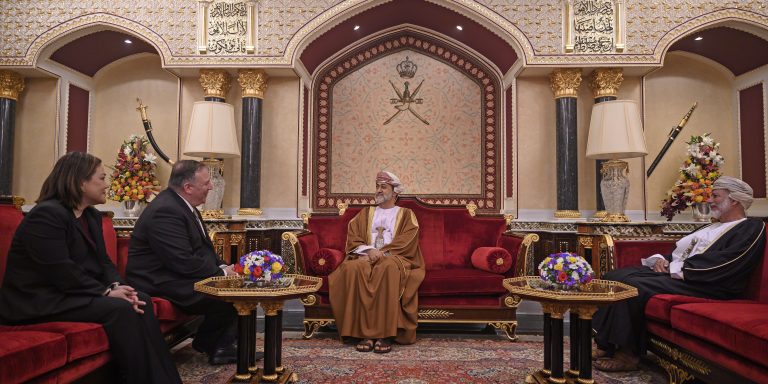INTELBRIEF
September 8, 2020
IntelBrief: Oman’s New Sultan Pressured on All Sides

Bottom Line up Front
- The Sultanate of Oman’s new leader, Sultan Haythim bin Tariq Al Said, is putting his own stamp on governance following the January death of Sultan Qaboos, who ruled for 50 years.
- Oman faces pressure from allies in the United States and the Persian Gulf to move away from Qaboos’ relative neutrality in regional affairs.
- The Trump administration is pressing the Sultanate to follow the United Arab Emirates in normalizing relations with Israel before the November 2020 U.S. presidential election.
- Sultan Haythim will continue Qaboos’ Iran policy, including potentially facilitating negotiations on a revised multilateral Iran nuclear agreement.
Qaboos bin Sa’id Al Said, who ruled the Sultanate of Oman, a key U.S. ally in the Persian Gulf since 1970, died in January after a long illness and was succeeded by his cousin, Sultan Haythim bin Tariq Al Said. The transition occurred just before the COVID-19 pandemic reached the region and further damaged Oman’s already fragile economy. Oman’s economic difficulties, and a region roiled by conflict and U.S.-Iran tensions, will test the new Sultan’s ability to maintain Qaboos’ longstanding policies of mediating between feuding nations and steering clear of direct military involvement in the region’s conflicts.
In August, Sultan Haythim sought to consolidate political control by replacing most of Qaboos’ cabinet. Among the major changes, Yusuf bin Alawi bin Abdallah, the Arab world’s longest-serving foreign minister, was replaced by the ministry’s Secretary-General, Badr bin Hamad Al Busaidi, who has elevated his profile in recent years with major speeches on Omani foreign policy. Sultan Al Habsi, formerly the Secretary-General of the Supreme Council for Planning and head of Oman’s tax authority, was installed as the Finance Minister. The new Minister of Commerce and Industry, Qais Al Yusuf, developed close ties to the private sector as head of the Omani chamber of commerce and industry. Sultan Haythim has, like Qaboos, formally retained the Defense Minister portfolio, but he has created the position of Deputy Prime Minister for Defense Affairs for his brother, Shihab bin Tariq, who has the extensive military experience that Sultan Haythim lacks.
Unlike most of its allies in the Gulf Cooperation Council (GCC), Oman is not a major oil and gas exporter and, unlike Bahrain, it cannot depend on substantial largesse from countries like Saudi Arabia. As a result, Sultan Haythim is considered vulnerable to pressure from the United Arab Emirates (UAE), which uses its financial weight, including on Oman, to try to accomplish regional goals. The UAE, a major investor in Oman, and the Trump administration, a close, strategic ally of Oman, are pressing the new Sultan to follow the UAE step of normalizing relations with Israel. There is also growing pressure for Muscat to distance its policies from Iran, a country which Qaboos always maintained consistent engagement. A normalization of Oman-Israel relations would be consistent with Qaboos’ policies, exemplified by his receiving Israeli Prime Minister Benjamin Netanyahu in Muscat on a surprise visit in October 2018. Secretary of State Mike Pompeo met with Sultan Haythim in late August to try to encourage Oman to announce such a normalization before the U.S. presidential election on November 3, a step that would help the Trump administration argue that it is bringing peace to the conflict-torn region. For the UAE, Oman’s joining it in normalizing relations with Israel could further isolate Qatar, a GCC state that the UAE (and Saudi Arabia) have been blockading since 2017. Qaboos, and thus far Haythim, have refused to isolate Qatar and have instead sought to mediate an end to the intra-GCC rift.
Pressure on Oman from its GCC allies, as well as the Trump administration, to join the U.S. strategy of ‘maximum pressure’ against Iran is unlikely to yield significant results. Sultan Haythim has given no indication that he differs with Qaboos’ policy of engaging Iran, entering into joint economic development ventures, and brokering understandings between Tehran and its adversaries, including the United States. Omani policy has been based on the belief that consistent interactions with Iran will produce positive changes in Iran’s behavior, whereas confronting Tehran will result in conflict. Oman did not join the Saudi-led coalition against the Iran-backed Houthi movement in Yemen, and Oman was the only GCC state not to downgrade relations with Iran in a 2016 diplomatic crisis between Iran and Saudi Arabia. Oman’s contacts with Iran enabled it to broker quiet U.S.-Iran talks in early 2013 that led to the 2015 multilateral nuclear deal. The Trump administration left that agreement in 2018 but President Trump seeks to revise the deal under terms more favorable to U.S. interests, and Democratic presidential nominee, former Vice President Joseph Biden, appears to favor returning to that accord. No matter the outcome of the U.S. election, Oman is likely to play a key role in bringing the United States and Iran together to the bargaining table.